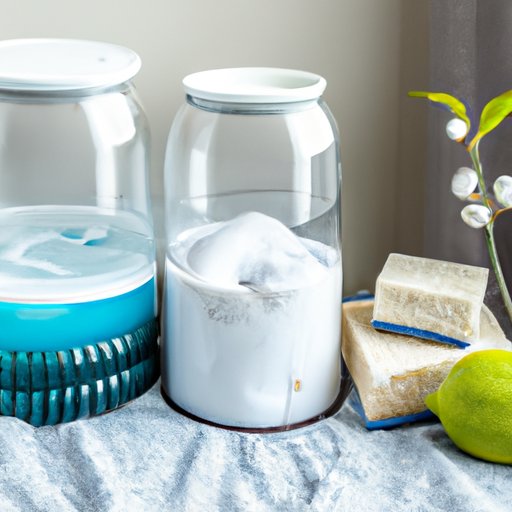Introduction
Laundry detergent is a cleaning agent used to remove dirt and stains from clothing, towels, bedding and other fabrics. It typically comes in liquid or powder form, although some products come in bar form, and it is usually mixed with water before being applied to fabrics.
There are many different types of laundry detergent available on the market, ranging from all-natural, eco-friendly options to traditional, store-bought varieties. Each type has its own unique benefits and drawbacks, so it’s important to understand the differences between them before making a purchase.

How to Choose the Right Detergent for Your Washing Machine
When choosing a laundry detergent, there are several factors to consider. First, you’ll need to decide what type of detergent you want: liquid, powder or bar. You’ll also need to consider the size of your washing machine and the amount of detergent it requires for optimal performance.
You should also take into account the type of fabric you’re washing, as some detergents are more effective on certain materials than others. Additionally, consider the fragrances and additives that may be included in the detergent, such as bleach or fabric softener, as these can affect the overall performance of the product.
When selecting a laundry detergent, it’s also important to read the label carefully. Most detergents will list instructions for how much product to use per load of laundry. Follow the manufacturer’s instructions to ensure that you’re using the correct amount of detergent for optimal results.
Tips for Making Homemade Laundry Detergent
Making your own laundry detergent at home can be a great way to save money and reduce your environmental impact. It’s also a great way to customize your detergent to suit your needs. There are many recipes available online for homemade detergents, most of which require only a few simple ingredients.
When making your own laundry detergent, it’s important to use the right proportions of ingredients to ensure that the detergent is effective. You’ll also need to consider the type of fabric you’re washing and adjust the recipe accordingly. Additionally, keep in mind that homemade detergents may not be as effective as store-bought varieties, so you may need to use more product to get the desired results.
Exploring the Benefits of Natural Laundry Detergents
Natural laundry detergents are becoming increasingly popular due to their lack of harsh chemicals and synthetic fragrances. These detergents are typically made from plant-based ingredients, such as coconut oil, baking soda and essential oils. They are often free from dyes, bleaches and other potentially harmful chemicals.
One of the main advantages of using natural laundry detergents is that they are better for the environment compared to traditional, chemical-based detergents. Additionally, natural detergents are generally gentler on fabrics, which can help preserve the life of your clothes. However, natural detergents may not be as effective as traditional varieties, so you may need to use more product to get the desired results.

Pros and Cons of Using High Efficiency Detergents
High efficiency (HE) detergents are specially formulated to work with high efficiency washing machines, which use less water and energy than traditional models. HE detergents are designed to produce fewer suds, which helps reduce waste and conserve water. Additionally, HE detergents are typically more concentrated than traditional detergents, meaning you’ll need to use less product for each load of laundry.
The main advantage of using HE detergents is that they are more efficient and less wasteful than traditional detergents. However, these detergents may not be as effective on heavily soiled items, and they may cause extra wear and tear on clothing if used incorrectly. Additionally, HE detergents are not compatible with all washing machines, so it’s important to check the manufacturer’s instructions to ensure that you’re using the correct type of detergent.

The Science Behind Laundry Detergent Formulas
Most laundry detergents contain a combination of surfactants, builders, solvents and enzymes. Surfactants help break down dirt and stains, while builders help soften hard water and prevent soil from re-depositing on fabrics. Solvents, such as alcohols and glycols, help dissolve grease and oils, while enzymes help break down proteins and starches.
These components are typically combined with fragrances, optical brighteners and other additives to create an effective cleaning formula. The exact composition of a laundry detergent formula varies depending on the type of detergent being used, but the basic principles remain the same.
What Are the Different Kinds of Eco-Friendly Detergents?
Eco-friendly detergents are specifically designed to reduce their environmental impact. These detergents are typically made from natural, biodegradable ingredients and are free from harsh chemicals and synthetic fragrances. Additionally, many eco-friendly detergents are designed to be more efficient, meaning you’ll need to use less product per load of laundry.
The main advantage of using eco-friendly detergents is that they are better for the environment compared to traditional detergents. Additionally, they are usually gentler on fabrics and may be more effective on certain types of soils. However, eco-friendly detergents may be more expensive than traditional varieties, and they may not be as effective on heavily soiled items.
Conclusion
Laundry detergent is an important part of keeping your clothes clean and fresh. There are many different types of detergent available, ranging from all-natural, eco-friendly options to traditional, store-bought varieties. Understanding the differences between these types of detergent can help you make an informed decision when choosing the right product for your needs.


